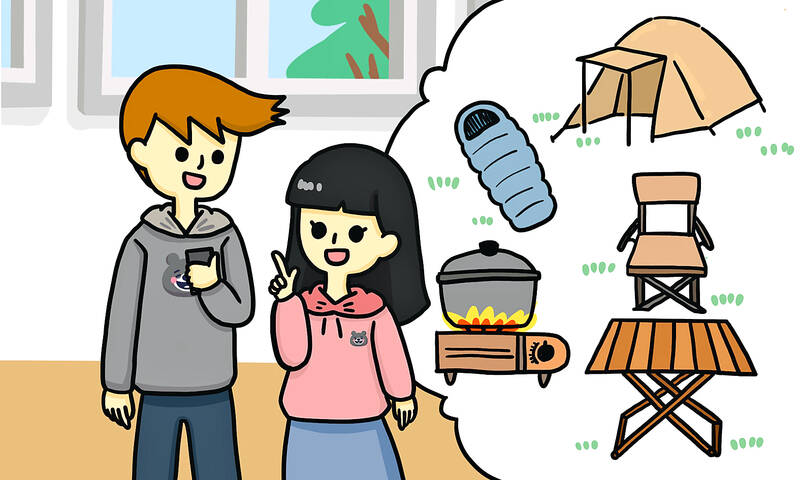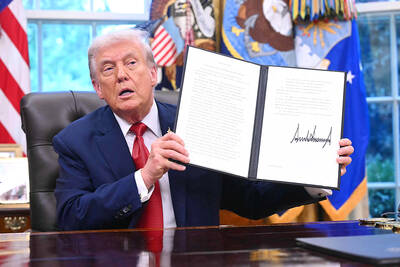對話 Dialogue
小實:馬克,我們下個週末要去露營,你想去嗎?
Xiǎoshí: Mǎkè, wǒmen xià ge zhōumò yào qù lùyíng, nǐ xiǎng qù ma?

馬克:好啊!我喜歡露營。你們要去哪裡露營?
Mǎkè: Hǎo a! Wǒ xǐhuān lùyíng. Nǐmen yào qù nǎlǐ lùyíng?
小實:我們要去苗栗,那裡有很棒的露營區。
Xiǎoshí: Wǒmen yào qù Miáolì, nàlǐ yǒu hěn bàng de lùyíng qū.
馬克:不過,我在臺灣沒有什麼露營的裝備。
Mǎkè: Búguò, wǒ zài Táiwān méiyǒu shénme lùyíng de zhuāngbèi.
小實:你可以先買帳篷和睡袋。
Xiǎoshí: Nǐ kěyǐ xiān mǎi zhàngpéng hàn shuìdài.
馬克:桌子、椅子、瓦斯爐,這些你們都有嗎?
Mǎkè: Zhuōzi, yǐzi, wǎsī lú, zhèxiē nǐmen dōu yǒu ma?
小實:是啊!大文常常去露營,所以裝備很齊全。
Xiǎoshí: Shì a! Dàwén chángcháng qù lùyíng, suǒyǐ zhuāngbèi hěn qíquán.
馬克:太好了!我先準備自己的床墊和防蚊用品。
Mǎkè: Tài hǎo le! Wǒ xiān zhǔnbèi zìjǐ de chuángdiàn hàn fángwén yòngpǐn.
翻譯 Translation
Xiaoshi: Mark, we are going camping next weekend. Do you want to join?
Mark: Sure! I like camping. Where are you planning to camp?
Xiaoshi: We are going to Miaoli, known for its great camping sites.
Mark: However, I don’t have any camping equipment in Taiwan.
Xiaoshi: No worries, you can buy a tent and a sleeping bag first.
Mark: Do you have a table, chairs and gas stove?
Xiaoshi: Yes! Dawen goes camping frequently, so he is well equipped.
Mark: Great! I will prepare my own mattress and anti-mosquito supplies first.
單字片語 Vocabulary
1. 露營 (lùyíng) camping
2. 露營區 (lùyíng qū) camping area/site
3. 裝備 (zhuāngbèi) equipment
4. 帳篷 (zhàngpéng) tent
5. 睡袋 (shuìdài) sleeping bag
6. 瓦斯爐 (wǎsī lú) gas stove
7. 齊全 (qíquán) complete; all in readiness
8. 床墊 (chuángdiàn) mattress
9. 防蚊用品 (fángwén yòngpǐn) anti-mosquito supplies
教材音檔 Audio Files
教材影片 Video Files:
https://www.instagram.com/celc.nou_tw/guide/_/17999106352646292/
實踐大學華語中心提供
By Shih Chien University Chinese Language Center: https://chineseusc.com/

The content recommendation algorithm that powers the online short video platform TikTok has once again come under the spotlight after the app’s Chinese owner ByteDance signed binding agreements to form a joint venture that will hand control of operations of TikTok’s US app to American and global investors, including cloud computing company Oracle. Here is what we know so far about its fate, following the establishment of the joint venture. IS BYTEDANCE CEDING CONTROL? While the creation of this new entity marks a big step toward avoiding a US ban, as well as easing trade and tech-related tensions between Washington and Beijing, there

Prompted by military threats from Russia, Denmark has recently passed a new conscription law, officially including women in its military draft for the first time. From July 1, 2025, Danish women, upon turning 18, will be entered into the draft lottery. If selected, they are to serve in the military for 11 months, just as men do. Not only has this decision attracted international attention, but it has also sparked discussions on gender, equality and national defense. Although Denmark’s reform appears to promote gender equality, it primarily responds to regional instability and the need to strengthen national defense. With

A: Happy New Year! I can’t believe it’s 2026 already. Where did you count down? B: I went to pop singer A-mei’s Taitung concert yesterday for the New Year’s countdown. How about you? A: I went to rock band Mayday’s Taichung concert yesterday. Going to their New Year’s shows has become a holiday tradition for me. B: Don’t forget, we’re also going to Jolin Tsai’s show tonight. It’s her first perfomance at the Taipei Dome. A: Yeah, that’s right. It’s great to start the year with good friends and good music. A: 新年快樂!我真不敢相信都已經2026年了。你昨天去哪跨年啦? B: 我昨天去了流行天后張惠妹的台東演唱會,還和她一起跨年倒數。那你呢? A:

Continued from yesterday(延續自昨日) https://www.taipeitimes.com/News/lang Many people attribute the four-leaf clover’s reputation for luck not merely to its rarity but also to the myths and legends that surround it. Here are two such tales that help shed light on how the four-leaf clover came to be seen as a lucky charm. The first story originates from the Biblical narrative of Adam and Eve. According to Christian tradition, Adam and Eve, the first humans created by God, resided in the idyllic Garden of Eden. After they were expelled for defying God’s command, Eve is said to have plucked a four-leaf clover as a